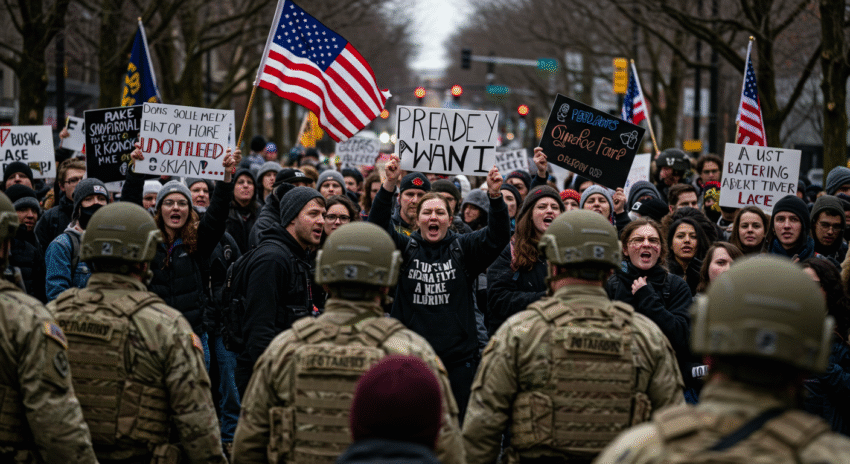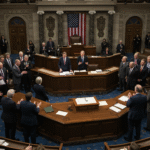Protesters in Portland have recently united in a significant display against the presence of federal troops in the city, ignited by rising tensions surrounding social justice issues, police reform, and civil rights. This push against federal intervention may well define a pivotal moment in the struggle for racial equity and systemic change, as the implications of this unrest reach far beyond the streets of Portland.
Historical Context
Portland has been at the forefront of the Black Lives Matter movement, particularly following the murder of George Floyd in May 2020. This event catalyzed national protests against police brutality and systemic racism. The city’s reputation as a progressive stronghold faced a test as demonstrations became increasingly contentious, leading to confrontations between local activists and law enforcement agencies. In July 2020, federal agents were deployed to Portland as part of a controversial effort to quell unrest, a move that prompted a significant backlash from local residents and activists.
Nature of Protests
The protests in Portland demonstrate a diverse coalition of individuals united against not only federal troops but also for broader aspirations, including racial justice, police accountability, and community safety. The protests have drawn participants from various backgrounds and organizations, encompassing civil rights activists, local residents, artists, and students. Signs citing phrases such as “No Justice, No Peace” and “Defund the Police” have become synonymous with the movement, emphasizing demands for substantial reforms in law enforcement.
Federal Response
The deployment of federal troops, particularly from the Department of Homeland Security (DHS), has intensified the dialogue surrounding government intervention in domestic protests. Protesters accuse these federal forces of escalating violence and intimidation rather than offering solutions to the issues at hand. Incidents involving federal officers using tear gas and other crowd-control measures have led to accusations of excessive use of force. Detractors argue that the involvement of federal law enforcement undermines local governance and erodes community trust.
Community Impact and Local Sentiment
The impact of federal presence in Portland has been one of divisiveness within the community. While some residents advocate for a strong federal response to ensure law and order, a significant portion sees this as an infringement on civil liberties. Local leaders and elected officials, including the Mayor and advocates for police reform, have expressed strong criticism of federal troops. They argue that Portland has the capacity to handle protests and that the approach taken by federal forces threatens to exacerbate tensions further.
Legal Ramifications
The protests surrounding federal troops in Portland also raise important legal questions. The use of federal authority to intervene in what many view as a local issue is fraught with potential constitutional conflict. Courts have historically grappled with cases involving federal overreach. Legal experts are examining whether federal authorities are acting within their jurisdiction or infringing on constitutional rights, particularly the First Amendment guarantees of freedom of speech and assembly.
Calls for Reform
The protests have led to calls for significant police reform at both local and federal levels. Activists are advocating for measures like increased transparency in police operations, better training for officers, and the reallocation of funds from police departments to community services. This call to defund the police has sparked numerous conversations about wealth redistribution and equitable resource allocation, resonating with broader movements standing against systemic racism in various sectors.
The Role of Media and Technology
Social media has played a crucial role in organizing the protests and amplifying the voices of activists. Platforms such as Twitter, Instagram, and Facebook serve as both a means of communication and a tool for mobilization. Live streams of protests have garnered widespread attention, bringing national consciousness to local issues. The images and messages shared online have managed to influence public perception, garnering support from individuals across the country who resonate with Portland’s demands for justice and equity.
Safety Discourses
Amid the protests, safety has emerged as a principal concern for both demonstrators and local residents. When considering the presence of federal troops, many protesters feel that the resultant violence puts their safety — as well as that of law enforcement officers — at risk. Vibrant discussions regarding non-violent methods of protesting, and the need for de-escalation techniques among police, have become essential components of protest dialogues.
Solidarity Across the Nation
Portland’s protests have sparked similar demonstrations in other cities across the United States. Activists are coming together, sharing strategies and resources that aim to confront the systemic issues inherent in law enforcement practices throughout the nation. Events in other urban areas often mirror those in Portland, emphasizing that the concerns over federal intervention and racial justice resonate deeply in diverse communities facing similar struggles.
Holding Law Enforcement Accountable
As the protests continue, many activists are focused on establishing mechanisms for accountability within law enforcement agencies. This includes demands for independent oversight boards to investigate allegations of misconduct, body cameras on officers, and requirements for transparency in police actions. The goal is not only to address current injustices but also to create a framework for the future that prioritizes the rights and safety of all citizens.
Potential Outcomes
The protests against federal troops in Portland may lead to significant policy shifts in how law enforcement operates at local and national levels. As community engagement increases, dialogues surrounding police practices and community safety will only grow in importance. The unity displayed by protesters stands as a reminder of the power of collective action and its potential to create a more equitable society.
Future Directions
In the coming months, the sustained energy and commitment of Portland’s activists will likely pave the way for continued discussions about systemic reforms in law enforcement and civil rights. The long-term impacts of these protests — and the community’s response to federal troops — may serve as a blueprint for other movements and protests in America, highlighting the ongoing battle for justice and equality across the nation.




